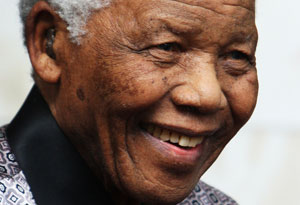Words to Live By: The Mandela Manual
Editor's note: We, along with the rest of the world, were deeply saddened to learn of Nelson Mandela's passing. The following is an O Magazine interview with Richard Stengel, who wrote a book about him in 2010.

Photo: Carlo Allegri/Staff/Getty Images
Whether as a political prisoner or as the democratically elected leader of his country, Nelson Mandela, now 91, has been a global symbol of endurance and hope for nearly half a century. Time editor Richard Stengel has spent hundreds of hours—more than any other journalist—in conversation with the hero of the South African antiapartheid movement, and draws on those talks for the new book Mandela's Way: Fifteen Lessons on Life, Love, and Courage. Below, some hard-won wisdom.
Gamble on goodness: Mandela always gives his adversaries the benefit of the doubt, sometimes to his regret (for example, South African president F.W. de Klerk won Mandela's praise but later proved disloyal). His rationale: "You tend to attract integrity and honor if that is how you regard those with whom you work."
Wear a brave face: Imprisoned in the early 1960s, a time when prisoners in South Africa were often beaten and tortured, Mandela stood up to an abusive guard. "You dare touch me, and I will take you to the highest court in the land," he declared. "By the time I am finished with you, you will be as poor as a church mouse." The guard backed down. "I was frightened," Mandela later said, "but one had to put up a front."
Create a sacred zone: In the early 1970s, Mandela began keeping vegetable gardens on prison grounds. (His first plot was a rocky patch measuring just one yard wide; lacking tools, he had to dig with his hands.) In so doing, he not only found a way to supplement his fellow inmates' scanty diet with fresh vegetables—he cultivated a place apart, a pocket of calm amid harsh realities. "You must find your own garden," he advises, simply.
 Mandela's Way: Fifteen Lessons on Life, Love, and Courage
Mandela's Way: Fifteen Lessons on Life, Love, and Courage
By Richard Stengel
256 pages; Crown
Oprah's interview with Nelson Mandela
Read more of this month's reviews
Plus, 10 at-a-glance reviews
Gamble on goodness: Mandela always gives his adversaries the benefit of the doubt, sometimes to his regret (for example, South African president F.W. de Klerk won Mandela's praise but later proved disloyal). His rationale: "You tend to attract integrity and honor if that is how you regard those with whom you work."
Wear a brave face: Imprisoned in the early 1960s, a time when prisoners in South Africa were often beaten and tortured, Mandela stood up to an abusive guard. "You dare touch me, and I will take you to the highest court in the land," he declared. "By the time I am finished with you, you will be as poor as a church mouse." The guard backed down. "I was frightened," Mandela later said, "but one had to put up a front."
Create a sacred zone: In the early 1970s, Mandela began keeping vegetable gardens on prison grounds. (His first plot was a rocky patch measuring just one yard wide; lacking tools, he had to dig with his hands.) In so doing, he not only found a way to supplement his fellow inmates' scanty diet with fresh vegetables—he cultivated a place apart, a pocket of calm amid harsh realities. "You must find your own garden," he advises, simply.
 Mandela's Way: Fifteen Lessons on Life, Love, and Courage
Mandela's Way: Fifteen Lessons on Life, Love, and CourageBy Richard Stengel
256 pages; Crown
Oprah's interview with Nelson Mandela
Read more of this month's reviews
Plus, 10 at-a-glance reviews



